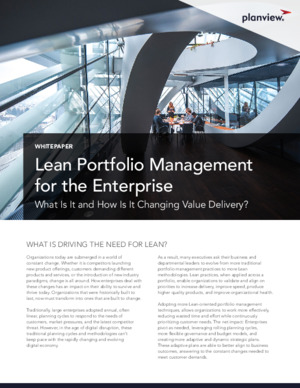
Lean Portfolio Management for the Enterprise

Traditionally, large enterprises adopted annual, often linear, planning cycles to respond to the needs of customers, market pressures, and the latest competitor threat. However, in the age of digital disruption, these traditional planning cycles and methodologies can’t keep pace with the rapidly changing and evolving digital economy.
Adopting more Lean-oriented portfolio management techniques, allows organizations to work more effectively, reducing wasted time and effort while continuously prioritizing customer needs. The net impact: Enterprises pivot as needed, leveraging rolling planning cycles, more flexible governance and budget models, and creating more adaptive and dynamic strategic plans. These adaptive plans are able to better align to business outcomes, answering to the constant changes needed to meet customer demands. Download to learn more.